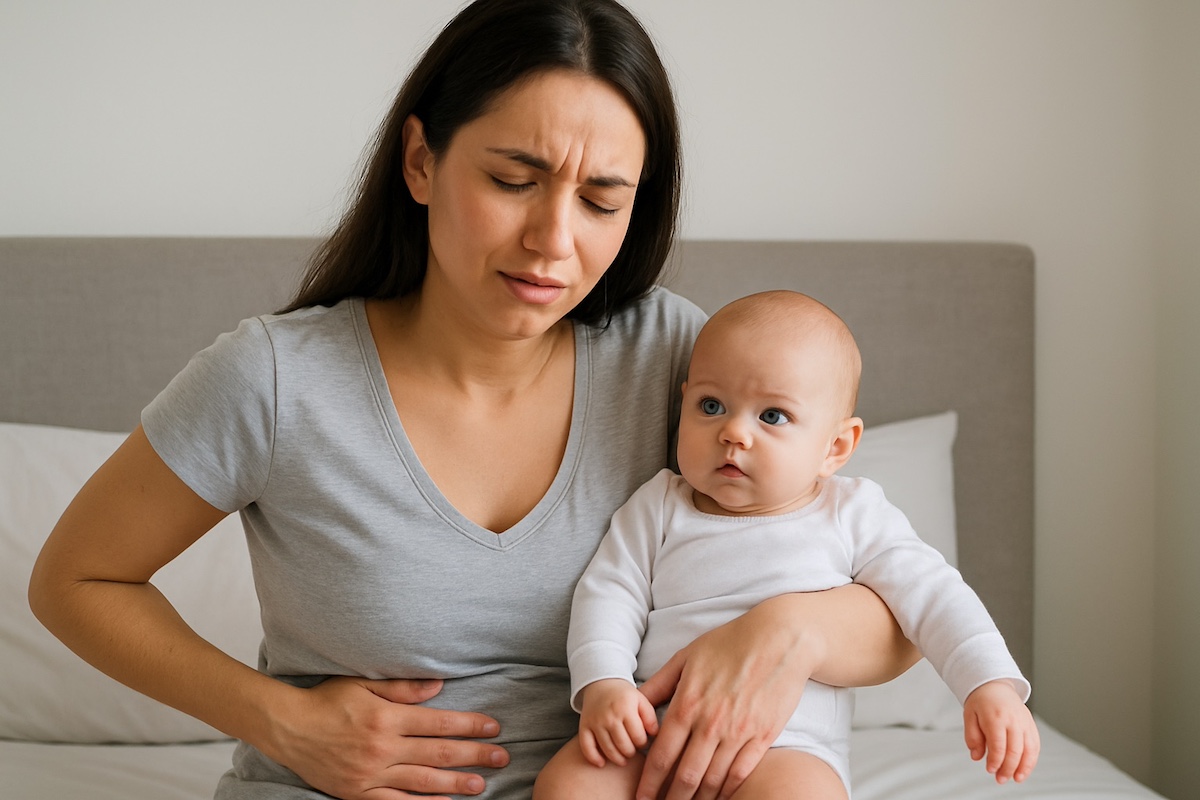Endometriosis is a complex condition that affects millions of women worldwide. For some, pregnancy brings temporary relief from symptoms. But what happens after childbirth? Can you develop or experience a flare-up of endometriosis even after having a baby?
The short answer is yes—endometriosis can occur or worsen postpartum. In this article, we’ll explore why that happens, what signs to watch for, and how you can manage symptoms effectively after giving birth.
What Is Endometriosis?
Endometriosis occurs when tissue similar to the uterine lining (endometrium) starts growing outside the uterus. These abnormal growths—called lesions or implants—are commonly found on the ovaries, fallopian tubes, bladder, and other pelvic structures.

Each month, this tissue behaves like the uterine lining: it thickens, breaks down, and bleeds. However, unlike menstrual blood, this tissue has no way to exit the body, which can lead to inflammation, pain, and scar tissue (adhesions).
Common Symptoms Include:
- Chronic pelvic pain
- Painful periods (dysmenorrhea)
- Pain during intercourse (dyspareunia)
- Infertility
- Fatigue
- Bowel or urinary discomfort, especially during menstruation
Does Pregnancy Cure Endometriosis?
There’s a widespread myth that pregnancy cures endometriosis. While it’s true that many women experience temporary relief during pregnancy, it’s not a cure.
During pregnancy, estrogen and progesterone levels shift dramatically, and ovulation halts. This hormonal environment may suppress endometrial growth, reducing pain and inflammation. However, these effects are usually temporary.
After childbirth, when hormone levels return to pre-pregnancy patterns—especially after menstruation resumes—symptoms often return and can even worsen.
Can You Develop Endometriosis After Having a Baby?
Yes. Some women may experience their first noticeable symptoms of endometriosis after giving birth. Others may find that previously mild or unnoticed symptoms become more pronounced.
There are two main possibilities:
- Previously undiagnosed endometriosis becomes symptomatic postpartum.
- New endometriotic lesions may develop after childbirth due to hormonal shifts and inflammation.
Even though pregnancy might delay or mask symptoms, it does not prevent endometriosis from progressing.
Postpartum Symptoms That May Indicate Endometriosis
It’s easy to dismiss certain types of pain as normal postpartum recovery. But persistent or worsening symptoms could point to endometriosis. These include:
- Pelvic pain that continues months after delivery
- Return of painful periods (even heavier than before)
- Pain during bowel movements or urination
- Pain during or after intercourse
- Chronic lower back or abdominal pain
- Fatigue not explained by sleep deprivation alone
If you notice these symptoms after your period returns or while breastfeeding, it’s important to consult your OB-GYN.
Causes and Risk Factors for Postpartum Endometriosis
While the exact cause of endometriosis is still being researched, several factors may contribute to its development or worsening postpartum:
1. Hormonal Shifts
After delivery, estrogen levels fall, then gradually rise again. Estrogen promotes the growth of endometrial tissue, and fluctuations may trigger flare-ups.
2. Genetic Predisposition
If your mother or sister has endometriosis, your risk is higher.
3. Inflammation
Childbirth and uterine surgery (including C-sections) can cause internal inflammation, which may support endometriotic growths.
4. Delayed Diagnosis
In many cases, women live with mild symptoms for years. Pregnancy may temporarily mask them, and symptoms may appear more severe once hormone cycles resume.
How Is Endometriosis Diagnosed After Childbirth?
Diagnosing endometriosis postpartum can be tricky, as many symptoms overlap with other postpartum conditions like uterine healing, infections, or pelvic floor dysfunction. Still, your OB-GYN can use several tools:
- Medical history and symptom review
- Pelvic exam
- Imaging such as ultrasound or MRI (not always conclusive)
- Laparoscopy is the gold standard for confirmation and staging
Treatment Options for Postpartum Endometriosis
Treatment varies depending on the severity of your symptoms, whether you’re breastfeeding, and whether you plan to have more children.
- Pain relief: NSAIDs like ibuprofen can reduce inflammation and relieve pain
- Hormonal therapy: Birth control pills, progestins, or IUDs can suppress symptoms; some medications may not be suitable while breastfeeding
- Surgery: Laparoscopic removal of lesions if other methods aren’t effective
- Lifestyle changes: Diet, exercise, and stress management can also help reduce symptoms
Impact on Future Fertility
If you’re planning to have more children, untreated endometriosis can affect fertility by blocking fallopian tubes, damaging ovarian tissue, or altering pelvic anatomy. However, many women with endometriosis go on to have healthy pregnancies. If you’re facing difficulty conceiving, consult your OB-GYN or a fertility specialist early.
Living with Endometriosis After Having a Baby
Motherhood brings enough challenges without chronic pain and uncertainty. If you’re experiencing unexplained pelvic pain, fatigue, or painful periods after giving birth, don’t ignore it. With the right diagnosis and care plan, you can get back to feeling like yourself again.
Support groups, mental health resources, and regular check-ins with your OB-GYN are all part of living well with endometriosis.
When to See a Doctor
Reach out to your healthcare provider if you notice:
- Persistent pelvic pain beyond postpartum recovery
- Painful periods that return worse than before
- Pain during intercourse, bowel movements, or urination
- Chronic fatigue or abdominal bloating
Don’t wait—early diagnosis can reduce complications and improve your quality of life.
FAQs
Can childbirth make endometriosis worse?
Yes, symptoms may return or intensify postpartum due to hormonal rebound and immune system changes.
Can you get endometriosis even if you never had symptoms before pregnancy?
Yes. It’s not uncommon for postpartum hormonal shifts to reveal previously silent endometriosis.
Is postpartum pelvic pain always endometriosis?
No. Other causes include healing tissues, infections, or muscle tension, so it’s important to get evaluated.
Can endometriosis return after pregnancy and breastfeeding?
Yes. Once menstruation resumes, many women notice symptoms returning, sometimes more severe than before.
Does breastfeeding help prevent endometriosis symptoms?
Breastfeeding may suppress ovulation and reduce estrogen levels temporarily, which can delay symptom return, but it’s not a guarantee.
Get Expert Postpartum Care at Clinton Women’s Healthcare
If you’re experiencing unusual pain, fatigue, or menstrual issues after having a baby, you don’t have to suffer in silence. At Clinton Women’s Healthcare, we specialize in identifying and treating conditions like endometriosis—even in complex postpartum cases.
Our compassionate team of OB-GYNs is proud to serve women throughout Utica, Macomb, and Clarkston, Michigan, with advanced diagnostics, personalized treatment options, and respectful, understanding care.
Book your consultation today and take the first step toward feeling better—because your comfort, recovery, and long-term health matter.
Visit us at clintonwomenshealthcare.com or call our office to schedule your appointment.
Your health after pregnancy is just as important as during it—and we’re here for you every step of the way.
